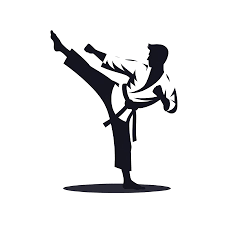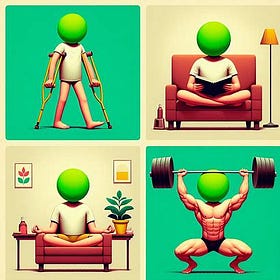From Karate to Contentment
Transforming stress into strength and fulfillment (insights from martial arts)
(3 min read)
Life lessons from martial arts
As a student at Princeton, I took karate and jiu-jitsu.
I’d never done something like it.
I’m not into war or any type of fighting.
But martial arts are similar to yoga, which is probably what attracted me.
They teach a lot about your body.
About your mind.
About life.
It was fascinating to learn about posture and positioning.
In order to control your movements with precision and force, it becomes clear that you should think about yourself as a structure or a robot.
You ask yourself how you would design it in order to have balance. Stability. Power.
“How should I lean and position each arm if I want my right leg to be able to do this?”
That line of thinking is unfamiliar to most people.
Asking those questions gives new perspective and insight.
What about happiness?
It’s been years since I participated in martial arts.
But similar questions are on my mind now.
How would you design a mind and its habits in order to be depressed?
Immediately you can think of some ways.
What about the opposite?
What about fulfilled and easily impressed and inspired?
What would be the design specs for a system that needs to be able to accept certain inputs and convert them to outputs that include a person who feels fulfilled and easily impressed and inspired?
(My nerdy engineering mind is shining through, yes.)
This might be the most important question we can ask ourselves.
Finding our answer would change everything.
People often give the pseudo-advice:
Happiness equals reality minus expectations but then don’t clarify how to actually lower your expectations (which is the part of the equation in your control).
Not easy.
Another story comes to mind.
Years ago, my stress (and emotional obliviousness) crippled me and ruined my life for a while, physically disabling me.
See:
Psychologists and authors would ask questions like “What are you feeling?”, and I couldn’t give descriptive answers.
Finally it occurred to me to pretend I was not me but instead was a friend watching footage of me from a security camera up in the corner of the room.
What would that friend think I might be feeling in each moment?
Sometimes it helps to depersonalize.
Hence thinking of your body as a robot during karate or yoga or similar activities.
Should you really care about positive experiences?
Think about the countless positive experiences you’ve had in the past.
Think about what became of those experiences.
They’re gone now right?
At most, you might enjoy their memories occasionally.
But you don’t get to continue living those experiences.
Weirdly what happens is when we think of the future, we overestimate the importance of positive experiences.
We get very attached to them.
We make choices as if it’s vital to maximize those positive experiences.
Ignoring the fact that they are so ephemeral.
Like the ones from the past that have disappeared.
There’s a paradox in mindfulness practice.
The more we are able to let go and not cling to experiences being a certain way (the more we are able to allow our experiences to be what they are and fully admit to ourselves that they are transient), the more we can savor the positive experiences.
Lately I’m playing with questions like:
What if I just accept that I’m going to hate every morning?
I’ve decided that it’s best if I start my day with fitness 365 days a year.
And I hate it.
But at a meta level, I also sorta hate that I hate it.
I’ve been wanting to figure out a way to overcome that and enjoy good habits.
But I don’t know if I can.
Sticking with difficult healthy habits is hard enough.
I wonder if I’m making it even harder by trying to figure out how to enjoy them (and in a way criticizing myself each day that I haven’t finally enjoyed them).
I don’t know yet, but maybe it would work to just accept that I’m going to hate every morning.
And maybe that’s an example of lowering expectations.
And maybe paradoxically it will lead to feelings of freedom and ease and whatnot.
Stay tuned.
(And / or share your thoughts in the comments.)
🕙 Recent posts:
🟢 Harsh
👀 Caught my eye this week:
Veritasium is always so impressive.
This particular topic has been on my mind for a long time (not just this election season).
I had been an opponent of the USA’s ridiculous stupid approach that is essentially a 2-party system (and has many other flaws too).
I’ve been trying to get people talking about Ranked Choice Voting and how we should switch to it.
This video was interesting because it agrees that RCV is better, but it also suggests another approach1 as even better than RCV!
(23m34s video)
🗨️ Quote of the day
“You don’t need to be perfect; all you need to do is interrupt your negative patterns.”
- Tony Robbins









